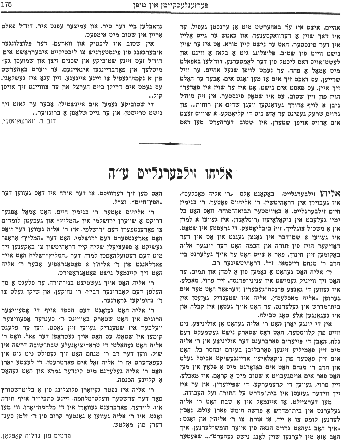
[Page 175]
all grown up – here he was walking all by himself in the darkness, and he wasn't scared at all. He wasn't far from home when a wind gust blew out his lantern light. Dovidel became seized with fear and started running home. He wanted to shout because he felt that someone was chasing him, but he restrained himself. It wasn't right for him to do it so close to home. It was pitch black, and Dovidel's started imagining demons and ghosts. He was so scared he couldn't find his key, and he started sweating. Inside the house his family could hear rustling at the door as someone opened it. Dovidel rushed in breathlessly.
It was bright and warm in the house. The sudden contrast from darkness to light impressed Dovidel as he saw his family and neighbors sitting and talking together. He felt like taking revenge on his family; his ego was hurt. He felt pressure on his heart and broke out in loud weeping. Everyone was quiet, but he didn't feel comforted – he went to bed feeling angry.
[Page 176]
[Photo:] Funeral of R. Mordechale Slonimer, 25 Adar, 1916 [trans.: 1916 was a Jewish leap year, so there were two Adars that year. The text here does not specify which Adar the funeral took place on] (see p. 154, “R. Asher Weitzel)
RABBI SHIMON TARASOV
[Photo:] Rabbi Shimon Tarasov
Rabbi Shimon Tarasov, a son of Rabbi Yosef Yehuda, was born in Brisk in 1885, and studied at the Novardok Yeshiva, where he studied together with the esteemed scholar, Rabbi Yaffen. In approximately 1915, he married Fruma, the daughter of Shmuel from Volevel, near Drohitchin, and settled in Drohitchin, where he was a teacher until 1924.
In 1924, Rabbi Tarsov and his family emigrated to the United States where they settled in Chicago. In Chicago Rabbi Tarsov served as a poultry ritual slaughterer, and taught at the Beit Rachel-Leah Talmud Torah (St. Louis Street). At the same time, he served as rabbi of the Yavneh Synagogue (for 3 years), the Horodok Synagogue, and the Kobriner-Karliner chassidic shtibel.
Rabbi Tarasov died on 24 Adar [March 13], 1950 in Chicago.
YOSEF SHOCHET
[Photo:] Yosef Shochet
Yosef Shochet, or Yossel Tchernes, was born in Motele and married in Drohitchin, where he was always involved in teaching. He taught children Talmud, and had a very analytical mind, like a philosopher. Unfortunately, there are no precise details about him. He died before World War I. R. Yossel had seven children: Avraham Shimon (Brisk), Reuven (Yanovo), Moshe (Palestine), Aryeh, Noachke, Hershel and Michel.
R. Yossel's grandson (son of Avraham Shimon) Yaakov was a professor of mathematics at the University of St. Petersburg. Afterwards, he became a full professor at the Navy Academy at Indianapolis, USA. He was also a professor at Ann Arbor University (Michigan) and Pennsylvania (Philadelphia). Yaakov died in the United States at the age of 77.
SHLOMO FRIEDENBERG
Shlomo Friedenberg was born in approximately 1880 in Drohitchin. His father, Berl, spent many years in yeshivas, and was known to be a scholar. Later he got married in Bilien (a village near Drohitchin), and went into business, though he was unsuccessful. He moved to town and became a teacher. Until World War I he taught children Talmud, and later taught it to older students at the Moriah School. Shlomo died in 1938 in Pinsk. His wife and children (except for one daughter in Palestine) were all killed. May G-d avenge their blood!
Previous Page
|
Next Page
JewishGen, Inc. makes no representations regarding the accuracy of
the translation. The reader may wish to refer to the original material
for verification.
JewishGen is not responsible for inaccuracies or omissions in the original work and cannot rewrite or edit the text to correct inaccuracies and/or omissions.
Our mission is to produce a translation of the original work and we cannot verify the accuracy of statements or alter facts cited.
 Drogichin, Belarus
Drogichin, Belarus
 Yizkor Book Project
Yizkor Book Project
 JewishGen Home Page
JewishGen Home Page
Copyright © 1999-2025 by JewishGen, Inc.
Updated 13 Dec 2001 by LA